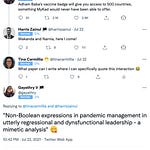Hey, Google, how do I cancel my subscription to the year 2020?
It has begun: Al Jazeera journalists questioned over Malaysia documentary. “The 101 East documentary called, Locked Up in Malaysia’s Lockdown, was broadcast on July 3, and investigated the plight of thousands of undocumented migrant workers arrested during raids in areas under tight lockdowns.”
Chua Minxi, with illustrations by Sharon Chin, for New Naratif: Malaysian cleaners protest amid pandemic. “Some people are saying it’s not a good time to do this. But what else can we do? Cleaners are being bullied so badly by the management. Every day, they’re getting harassed. We can’t just sit still and do nothing.”
Harrison Mantas for Poynter: Fact-checking a moving target. “COVID-19 is a fast-moving story. Information is changing almost daily. Scientists are still learning about it. Public health guidance is evolving. And when questions scientists still haven’t formed a consensus around seep into the public arena, it becomes a ripe environment for confusion and misinformation. It’s a quandary that fact-checkers and other journalists have to contend with.”
This week’s edition is brought to you by the letter C
A letter I received from an old friend – a delight in these lonely lockdown days.
A few months ago, I started reading a lot of essays to fill up my downtime. I am a slow reader, so books usually feel like quite a big task to tackle even when the movement restriction order gave a lot of time for that. I then shared some of these essays on my social media accounts and started getting some new recommendations.
Soon, my reading list expanded to include letters – famous correspondences – and although drawn to them, I felt unsettled. It seemed invasive even when these letters are published posthumously.
I love writing letters, although I don’t have many to write to. Sometimes, I wonder what happens to the letters I have sent – do they get destroyed or kept, or shared?
I am not sure anyone except the intended recipient ought to be privy to its content. Yet, I find great joy and learning in reading published letters – from Frida Khalo to Diego Rivera, President Soekarno to General Soedirman, Ada Lovelace to Charles Babbage, and those between Vita Sackville-West and Virginia Woolf, to name some.
Unlike novels where characters are fictional or films where real people play fictional characters, letters reveal real people through their most private correspondences.
Similar to cinema, which frame – even in its highest definition and widest screen format – constraints the peeping hole through which we gaze, a letter tells only what is written, within the margins of the pages. Then, we fill in the blanks when references are made of events outside of what is detailed within the letter. In a series of correspondences, we track dates, locations, people – and wonder, and allow the mind to wander. With each re-read, we contort the narrative with the limits of the frame or the artefacts of our imagination.
A letter is not written for a third party. Except for open letters, the publication or release of letters is rarely the decision of the letter writers or receivers. Who has the right to the letters? Private correspondences are not intended for a mass audience. The writer and receiver are not aware of the audience. Yet their letters are published.
In what ways do we profit from the repurposing of these letters? Beyond financial gains for the publishers, the readers, who are not the intended receivers, derive pleasure from them. And is the pleasure a guilty one?
Perhaps to truly appreciate rights to privacy is to experience taking it and having it taken from you. The invasion into the intimate (not always sexual) spaces of others is sometimes an issue of power; sometimes this gaze is void of a moral perspective, but usually, there is a pleasure – a guilty one. Maybe we are voyeuristic by nature.
What I read, watch and listen to…
I’m reading up Katherine Gillespie’s piece for PaperMag about cottagecore and why it is so popular on queer Tiktok.
I’m recommending Reuters’ excellent interactive piece on why time feels so weird in 2020 by Feilding Cage.
I’m watching Jodie Cormer reading a love letter from Vita Sackville-West to Virginia Woolf:
I’m sharing this amazing, single-word tweet by Monica Lewinsky; what a glorious sense of humour:
Chart of the week
Financial Times’ N-shaped curve graph on OECD unemployment is visually astonishing:
Fakta, Auta & Data #4: Jang4n ragv-ragv mengamb!l ke5emp4tan
Baru-baru ini, saya pelajari kenapa sesetengah laman web berbahasa Melayu, contohnya The Patriots dan Limau Madu Press, mengubah ejaan untuk perkataan seperti m*ti, menump4hkan, terb0ngkar, svspek, dsb. Yang saya boleh perhati, kebanyakkan perkataan-perkataan yang diubah ejaannya mempunyai konotasi negatif ataupun bersifat sensasi.
Penapisan kendiri ini dibuat untuk mengelak dikesan oleh sistem algoritma rangkaian sosial supaya tidak disenaraihitamkan dan masih memenuhi syarat pengewangan untuk menjana pendapatan. Pengubahsuaian ini setakat ini masih lagi boleh mengatasi sistem penyekatan.
Dalam Fakta, Auta & Data #2, sudah saya jelaskan pengaruh bahasa dan budaya dalam teknologi:
Tanpa pengetahuan mengenai bahasa tempatan dan konteks sosiopolitik di kebanyakan negara di Asia dan Afrika, syarikat Big Tech yang berpusat di barat tidak mampu menangani kempen disinformasi tempatan di laman mereka.
Rangkaian sosial seperti Facebook dan Twitter masih ketinggalan dalam penambahbaikkan algoritma untuk mengesan dan menghapuskan maklumat palsu dengan berkesan. Biarpun bahasa Melayu selangkah di belakang dari segi keperkasaan kosa kata teknikal, ia masih unggul dalam mengatasi sistem bot yang tidak cekap menyekat penularan maklumat yang tidak sahih dan tidak berbukti.
















